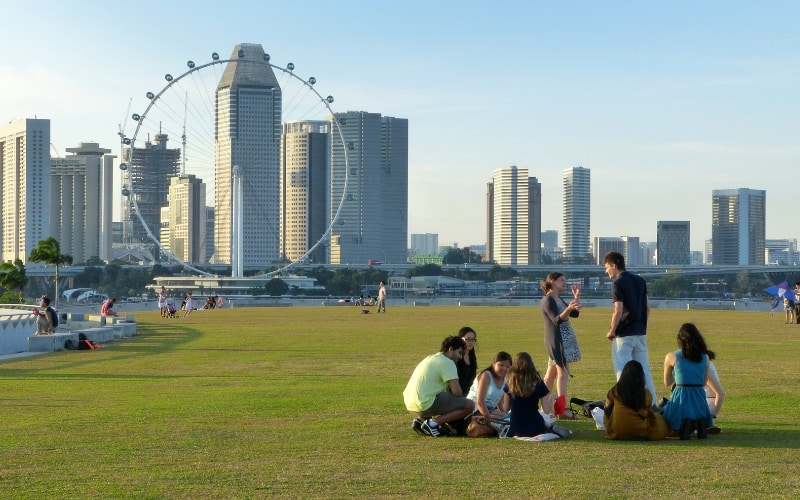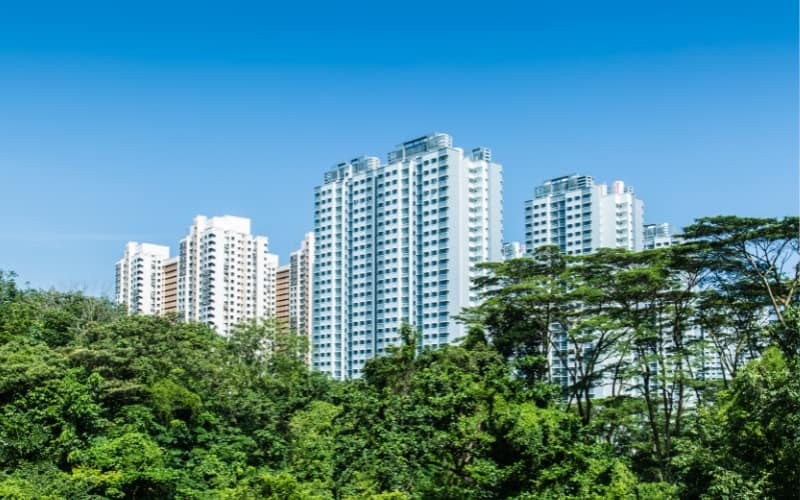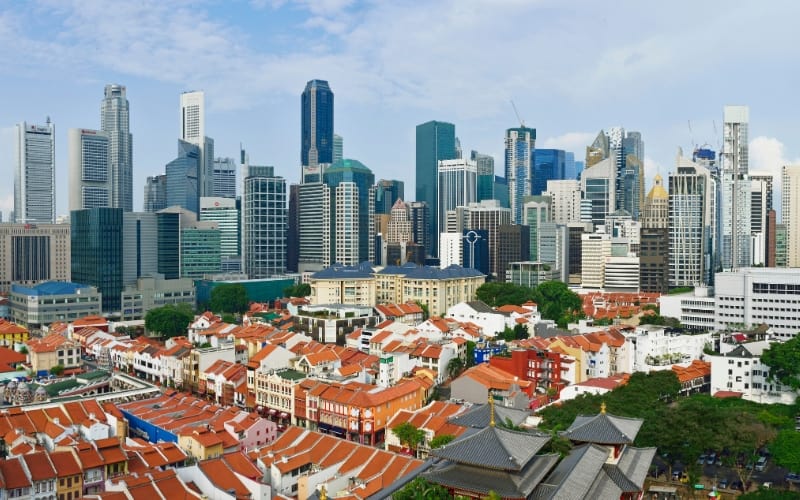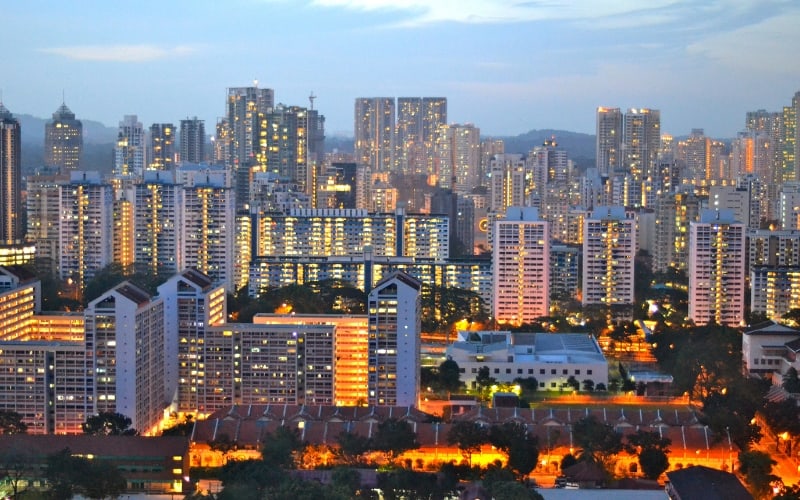Moving to Singapore and wondering how to find the right accommodation for your need? Check out our property relocation guide for expats…
There is a lot to love about Singapore, and it’s a country that draws in thousands of expats each and every year. It boasts a robust economy with numerous job opportunities in finance, technology, and other industries.It consistently ranks as one of the safest and cleanest cities globally, offering a secure environment for families and individuals alike. Plus, Singapore’s diverse population ensures a rich tapestry of cultures, languages, and cuisines, making it a melting pot of experiences. When you factor the city’s high quality international schools and universities, it’s easy to see why Singapore is an ideal destination for families.
If you are considering making the big move from the UK to Singapore, it’s important to find the right accommodation. With its vibrant culture, bustling economy and tropical climate, it’s now wonder that Singapore is a top destination for expats. But, to ensure a smooth transition, you need to find the right housing or rental accommodation for your individual needs. In this blog, we will delve into the various types of housing available in Singapore, helping you make an informed choice for your new home.
Understanding the Types of Housing Available in Singapore

Moving to Singapore from the UK is an exciting adventure, and finding the right accommodation will play a pivotal role in ensuring a seamless transition. With a clear understanding of the housing options available, you can embark on your journey with confidence.
Public Housing
There is a lot of public housing in Singapore, and it’s an option that represents a lot of the housing options in the country. Public housing, also referred to as Housing and Development Board (HDB) flats, are an affordable option for Singaporean residents. As an expat, you can purchase resale HDB flats as long as you have Permanent Resident (PR) status. There are often restrictions on the flat’s remaining lease, so this is something to take into consideration.
Private Housing
There are a lot of private housing options in Singapore such as condominiums, landed properties and apartments. All of these provide something slightly different in terms of accommodation and lifestyle. For example, condominiums are high rise apartment complexes and they can have a variety of amenities such as swimming pools, gyms and security. Landed properties are terraced houses, semi-detached houses and bungalows which provide spacious living options. These tend to be favoured by families. There are also a number of small apartments available in various neighbourhoods, offering a mix of affordability and convenience.
Serviced Apartments
When you first move to Singapore, you might consider living in a serviced apartment. These are ideal for short term stays, such as if you have just arrived in Singapore and haven’t yet found somewhere permanent to live. Serviced apartments offer amenities that are similar to those found in a hotel, with the comfort of home. They are fully furnished and provide housekeeping services.
There is an emerging trend in Singapore, shared accommodations and co-living spaces. These options provide a sense of community and offer flexibility in lease terms, and are usually favoured by young people and individuals. They are less suitable for families, but are often beneficial for individuals looking for a short term accommodation option.
Popular Areas for Expats
Singapore offers a diverse range of neighbourhoods, each with its unique charm and appeal. Expats often choose their residence based on factors like proximity to work, lifestyle preferences and family needs. Here are some of the most popular areas for expats.
Central Regions: Orchard, Newton, Holland Village
Orchard is known for its upscale shopping malls. It’s a bustling shopping and entertainment hub and expats enjoy the convenience of luxury living, with numerous dining and retail options. Newton is slightly different, and it offers a mix of modern condominiums and green spaces. It’s known for its proximity to the Central Business District and its good public transport links.
Holland Village is a vibrant neighbourhood that boasts a relaxed atmosphere, an array of dining options, and a strong expat community.
East Coast: Katong, Siglap and Tampines
Katong is famous for its Peranakan heritage, colourful shophouses and local cuisine. It’s a charming and culturally rich area with a laid back atmosphere. Siglap offers a mix of landed properties and apartments. It’s known for its proximity to the beach and family-friendly vibes.
Tampines is one of Singapore’s largest residential areas, offering a wide range of housing options. It’s known for its excellent amenities, including shopping malls and parks.
West: Bukit Timah and Clementi
Nestled near lush greenery and nature reserves, Bukit Timah is favoured by expat families. It’s known for its prestigious schools and tranquil surroundings. Clementi offers a mix of public and private housing. It’s a family-friendly area with schools, parks, and shopping centres.
North and North-East: Ang Mo Kio and Serangoon
Ang Mo Kio is a residential town with a mix of public housing and condominiums. It’s known for its accessibility and proximity to industrial areas. Serangoon, particularly the Serangoon Gardens area, is popular among expats. It offers a blend of housing options, international schools and a thriving restaurant scene.
Factors to Consider When Choosing Accommodation in Singapore

Before you embark on your journey to find the perfect accommodation in Singapore, it’s important to consider various factors to ensure that your new home meets your needs and lifestyle.
Proximity to Workplace or Business Districts
One of the most important things to think about when you are choosing accommodation in Singapore is its proximity to your workplace or business district. Singapore’s compact size makes it relatively easy to commute from A to B, but minimising travel time can make a big difference.
Access to Public Transport
Singapore is well known for having an efficient public transportation system, which is a major advantage for residents. When you are looking for accommodation, check the availability of nearby MRT stations or bus stops. Easy access to public transport can save you time and make your time in the city more convenient.
Nearby Amenities
You are bound to need amenities, so consider the proximity of essential amenities to your chosen accommodation. Look for nearby supermarkets, schools, doctors and hospitals, and recreational facilities. Having these amenities within easy reach can simplify your daily life. For example, access to supermarkets allows you to easily stock up on daily essentials and groceries. If you have children who will be going to school in Singapore, proximity to good schools is key for their education and your peace of mind.
Budget Considerations
Your budget plays a significant role in determining the type of accommodation that you can afford in Singapore. Keep in mind that the cost of living in the city can vary greatly depending on the neighbourhood and type of housing, so it’s important to consider all of your options. Consider your monthly rent budget and explore different neighbourhoods that fit within your means, and factor in the cost of utilities such as electricity, water and WiFi when calculating your monthly expenses. For condominiums or serviced apartments, be aware of maintenance fees, which can vary widely.
Lease Terms and Conditions
Before finalising your accommodation choice, carefully review the lease terms and conditions. Determine if the lease term aligns with your plans, whether it’s a short term or long term commitment. Understand the amount of security deposit and advance rent required before moving in. You should also familiarise yourself with the termination clauses, including notice periods and penalties for early termination. As a lot of properties are rented in Singapore, navigating lease terms and conditions is likely to be a key part of your search for a new home.
The Property Search Process

Searching for the perfect accommodation in Singapore can be an exciting journey, but it’s important to navigate this process strategically to find your dream home.
Engaging a Real Estate Agent
When you use a real estate agent, you can benefit from their in-depth knowledge of the Singapore property market including trends, neighbourhoods, and pricing. You will also have access to a wide range of property listings, including both public and private housing. A real estate agent can negotiate on your behalf to secure the best deal and favourable terms.
They can provide legal guidance and ensure that the transaction complies with Singaporean laws and regulations, and they can save you time by pre-screening properties that match your criteria.
When you are choosing a real estate agent, make sure to choose someone who truly understands the property market in Singapore. Ask about their experience in the industry and whether they specialise in specific types of properties or neighbourhoods. It’s also a good idea to Inquire about their insights into the current property market and their knowledge of the latest trends.
DIY Online Search
If you don’t want to use a real estate agent, you can carry out your own property search online. One way to do this is via PropertyGuru, one of Singapore’s leading property websites, offering a vast database of listings and informative articles. iProperty is another option, which offers a wide range of property options and a mobile app for convenient browsing.
When you are looking for a property online, use search filters to narrow down your options by location, price range and property type. New properties are added regularly in Singapore, so check listings frequently to stay up-to-date.
Physical Visits
Once you have identified potential properties online or through an agent, it’s time to schedule physical visits. If you’re working with an agent, they can help you arrange viewings with the property owners or agents representing the properties. Prepare a list of questions to ask the property owner or agent during the viewing.
You should inspect the condition of the property, including any visible wear and tear, structural issue, or necessary repairs. Check for amenities such as parking spaces, swimming pools, gyms and security features. A lot of properties in Singapore come with amenities, but they do vary. Evaluate the neighbourhood, including accessibility to public transport, nearby amenities, schools and how safe the area is.
Understanding the Leasing Process

Leasing a property in Singapore involves a structured process designed to protect both landlords and tenants. Understanding this process is key for a smooth transition to your new home.
Requirements and Documents
Before you can secure a rental property in Singapore, you’ll need to prepare the necessary documents and meet specific requirements. For example, you must ensure that you have a valid work pass or visa to reside in Singapore legally. You will also need to provide proof of identity, typically in the form of your passport or identification card. An employment letter from your employer stating your position, salary and duration of employment is also essential.
Security Deposits and Advance Rental Payments
As part of the leasing process, you will need to make certain financial arrangements. Typically, landlords in Singapore require a security deposit equivalent to one to two months’ rent. This deposit is held by the landlord during your lease term and is refundable upon the successful completion of your tenancy, provided there are no damages or outstanding rent. You will usually be asked to pay the first month’s rent in advance before moving into the property.
Lease Negotiation Points
When reviewing the tenancy agreement, you need to pay attention to specific lease negotiation points to ensure a fair and comfortable rental experience. Always clarify the responsibilities for maintenance and repairs; understand what the landlord covers and what you are expected to maintain. Discuss whether the property is fully furnished or partially furnished and ensure that it aligns with your needs.
You should confirm the lease duration, including start and end dates, and understand the termination clause, including notice periods for both parties and any penalties for early termination. Check if there are renewal options and the terms associated with renewing the lease. Inquire about the possibility of rent increases during the lease term and the notification period for such changes.
Costs Associated with Renting
When considering the cost of renting in Singapore, you need to factor in several expenses other than the monthly rent. In addition to your rent, you’ll typically be responsible for utility bills, such as electricity, water and gas. Internet and TV subscriptions are also additional costs.
If you choose to live in a condominium, maintenance fees contribute to the upkeep of common areas and facilities. These ensure a well-maintained living environment. Understanding these costs in advance helps you to budget effectively and make informed decisions before finalising your housing.
Legalities and Lease Agreements
Navigating the legal aspects of leasing a property in Singapore is key for both landlords and tenants. A lease agreement provides clarity and protection for both parties involved.
Standard Terms in a Singapore Lease Agreement
Though lease agreements may vary depending on the landlord and property, there are common standard terms you can expect to find in most lease agreements in Singapore. These typically include details about the rental amount, payment frequency, security deposit and utility responsibilities. You should thoroughly review these terms before signing to ensure that they align with your expectations and requirements.
Understanding the Tenancy Agreement (TA) and Letter of Intent (LOI)
In Singapore, the leasing process typically involves two main documents: the Letter of Intent (LOI) and the Tenancy Agreement (TA). The LOI is a preliminary document that outlines the initial terms and conditions of the lease, including the proposed rental amount, lease duration, and other key terms. It is usually submitted by the prospective tenant to express their intention to rent the property.
Once both parties agree to the terms in the LOI, the next step is to draft the Tenancy Agreement (TA). The TA is a more comprehensive and legally binding document that provides detailed terms and conditions, including responsibilities, obligations, and rights of both the landlord and tenant. It’s essential to review the TA thoroughly and seek legal advice if needed before signing, as it governs the entire lease period.
Termination and Renewal Clauses
Lease agreements in Singapore typically include termination and renewal clauses. These clauses outline the conditions under which either party can terminate the lease and the notice periods required. Understanding the termination clause is key if you plan to move out before the lease term ends. Landlords often require tenants to provide advance notice and there may be penalties for early termination.
Renewal clauses specify the process for extending the lease beyond its initial term. They may include terms for rent increases, security deposit adjustments and renewal notice periods.
Tips for a Smooth Transition When You Move to Singapore

Moving to Singapore can be an exciting adventure, but it also comes with its share of challenges and uncertainties. To ensure a smooth transition and make settling into your new home a breeze, it’s essential to plan ahead and gather as much information as possible. 1.
Engage in Preliminary Research Before Arriving
Before you set foot in Singapore, take some time to conduct preliminary research about the country and its housing market.Explore the various neighbourhoods in Singapore to get a sense of their vibe, proximity to your workplace and suitability for your lifestyle. Familiarise yourself with rental prices, common lease terms and the types of housing available. This will help you set realistic expectations and budget accordingly. Understand the legal requirements for renting a property in Singapore, including visa or work pass restrictions, and any necessary documentation.
Consider Temporary Accommodation Before Finalising Long-Term Housing
It’s usually a good idea to secure temporary accommodation for your initial weeks or months in Singapore. This allows you to settle in without rushing into a long-term housing commitment. Consider options like serviced apartments or short-term rentals, which provide a comfortable and flexible living arrangement while you explore your housing options more thoroughly.
Network with Other Expats for Recommendations and Advice
Singapore is home to a vibrant expatriate community, and networking with fellow expats can be helpful. Attend expat events, join online forums or social media groups, and connect with people who have already experienced the challenges and successes of moving to Singapore. They can offer valuable recommendations for housing, neighbourhoods, schools and more.
Familiarise Yourself with Local Norms and Customs Related to Housing
Every country has its unique norms and customs related to housing, and Singapore is no exception. Learn about common practices in Singaporean housing, such as removing shoes before entering homes, and respecting the privacy of neighbours. Understand the roles and responsibilities of property management, especially if you’re moving into a condominium or apartment complex. Be mindful of cultural sensitivities and customs that may influence housing choices, such as the orientation of your home.
Planning Your International Move

There is a lot that goes into an international move, and it’s important to do thorough research before getting started. It’s also important to seek advice when needed, as this can help to make the move as smooth and stress-free as possible. But, the most important thing is to embrace the adventure of moving to a new place and making it home.
At United International Removals, we provide removals and shipping to Singapore, and you can get a quote today. We are on hand to get your belongings to Singapore, regardless of how much you have and why you are moving. We help lots of people move to Singapore, including expats and returning residents, and we are ready to help you too. Contact us to find out more.
